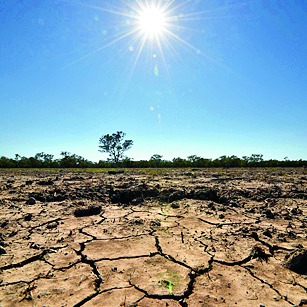
The most familiar problem about the natural environment is, arguably, climate change. It is not, however, the only problem of sustaining economic development over time. During the last 200 years, energy consumption per person has increased five-fold while the global population has increased seven times - from around a billion to above seven billion. The Industrial Revolution and the rise of capitalism have caused different kinds of alarming stresses on the natural environment, such as the possibility of climate change and the loss of biodiversity. The implicit assumption in production and consumption has been that nature is limitless. Hence it is absolutely fine to draw resources at will from a bottomless gift hamper. Nature is also thought to be a bottomless garbage dump where wastes can be put in endlessly without having to worry about consequences. Nature is there to be used to humanity's advantage. Apart from being a source of important resources used in production and its waste absorption property, nature provides certain unpaid services like clean air, fresh water and the fertility of the two inches of top soil without which no life is possible.
Ecological systems also provide essential services like pollination, local climate regulation, nutrient recycling and biological pest control. What is important to realize is that nature is limited within the boundaries of the planet, earth. The economic system is yet to come to terms with this obvious truth. Elementary textbooks, even in the 21st century, teach students that production depends on physical capital, labour and technology alone. Consumption is limited only by income and prices, while for the macro economy, continuous increases in national income are necessary and constitute an acceptable yardstick of economic performance. To most economists and policymakers, unlimited growth is not only desirable but possible too. Therefore, it is fair to deplete resources and pollute the environment indefinitely. The market is supposed to send signals when problems arise. For instance, if the world begins to run out of an important natural resource like oil, the price of oil will rise so much that people will look for solutions. Technology will come to the rescue as humanity will have found a substitute. Similarly, too much pollution will create excessive social costs forcing society to find ways and means, including technological solutions, to curb pollution.
This line of argument frequently used by economists is incorrect for at least two reasons. The first is that the market responds to incremental changes which can be reasonably well predicted when we think in terms of linear systems. Scientists know well that nature does not behave in a linear fashion. Small changes can suddenly alter to swift catastrophic changes with huge economic and social costs. It is a complex system composed of a number of sub-systems which interact with one another continuously and influence the behaviour of the whole system. Markets might completely collapse when sudden large changes take place. This is well understood through the behaviour of financial markets. The second reason is that not all natural ecosystem services have markets where prices are determined through the interplay of demand and supply. There would not be any warning signals about the stress and loss of resilience in these services.
Ecological system services such as the recycling of nutrients or local climate control or the availability of fresh water are cyclical in terms of their dynamic property - it recurs through repetition. The repetitive cycles regenerate most of these services. Nature has, as it were, given its residents a stock of capital and the ability to generate some services out of it. As long as human beings use the flow of services without damaging or depleting the stock everything is fine. If, on the other hand, human beings use these services in quantities which are in excess of the rate at which the services can be regenerated, the stock declines. As the stock declines, the ability of nature to provide these services in the future declines. Human beings cannot replenish the stock as we still do not know how to create them. Hence the ability of the economic system to be as productive as before will be eroded. Apart from the obvious economic effects, there are unknown effects in terms of how nature reacts to this destruction. Finally, nature's resources are there to be shared by all living beings. The loss of ecological system services will have adverse effects on other species too, endangering their existence.
The consumption of these services can be measured with reasonable accuracy. It is also possible to find out whether we are 'eating' up part of the capital stock. The Global Footprint Network (an international think tank) measures the Earth Overshoot Day every year. It is the date on which humanity's resource consumption for the year exceeds the earth's capacity to regenerate those resources. Initially it was referred to as the Ecological Debt Day. The biocapacity of the earth is the amount of natural resources generated by the earth in a year while the ecological footprint is the amount of consumption of those resources. The ecological footprint is divided by the biocapacity and multiplied by 365 to arrive at the date. In, 1971 it was December 21, while this year it has advanced to August 2. The threshold was crossed in 1971 and till date the deficit is increasing every year - too much carbon dioxide emission, shrinking forests, collapsing fisheries, interrupted nitrogen and phosphorous cycles.
The advancing date of the Earth Overshoot Day, amongst many other indicators of environmental damage and alarming rates of resource depletion, indicates a number of things. The first is that the business-as-usual model of production and consumption, in spite of the astonishing speed of technological change, is not helping to preserve and protect nature. Humanity cannot afford to ignore this fact. The second is that these problems are global problems. In today's interconnected world, no environmental problem is purely local. Nature is shared by all species and we cannot create indefinite natural space. The solution must be a shared, global one. Finally, every nation must learn perforce to think beyond narrow national interests. This aspect of globalization has been largely neglected in the neo-liberal conception of the world.
According to the Living Planet Report of 2014, India's ecological footprint is the third largest after China and the United States of America. Brazil and Russia come fourth and fifth. India's share is 7.1 per cent. Together the top five nations demand 50 per cent of the earth's natural resources. The report suggests that at the current moment we would require one-and-a-half planets to meet all the natural resource requirements.
The real problem arises from the fact that the world's image of development and the good life is about a resource and energy-intensive lifestyle with continuous increases in consumption of goods and services. It is not easy to alter that. It requires as a starting point that nations, business organizations and people begin to think beyond myopic narrow interests. The individual can be happy and safe only if the world is a better place to stay in. At the moment the world appears to be far away from thinking about these big picture issues at the level of policy. Our own nation still continues with an idea of development that is resource-guzzling, energy consuming, regimented, and consumerist. We are all expected to think alike to be one nation. New ideas are suspect at the best, or contested with force at the worst.
The author is former professor of Economics, IIM Calcutta










